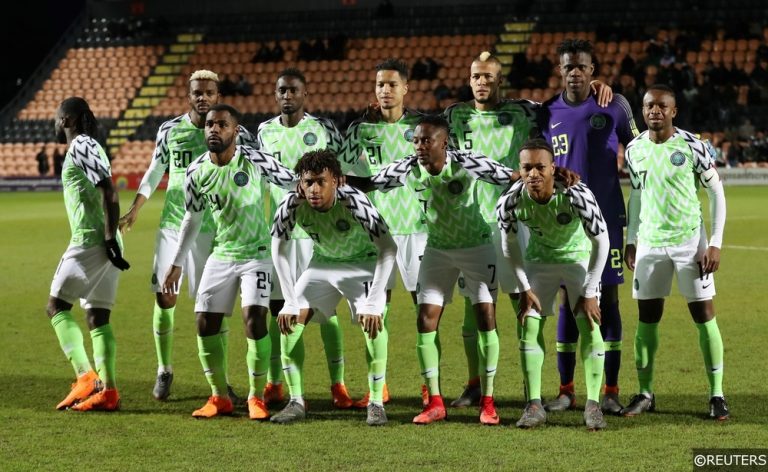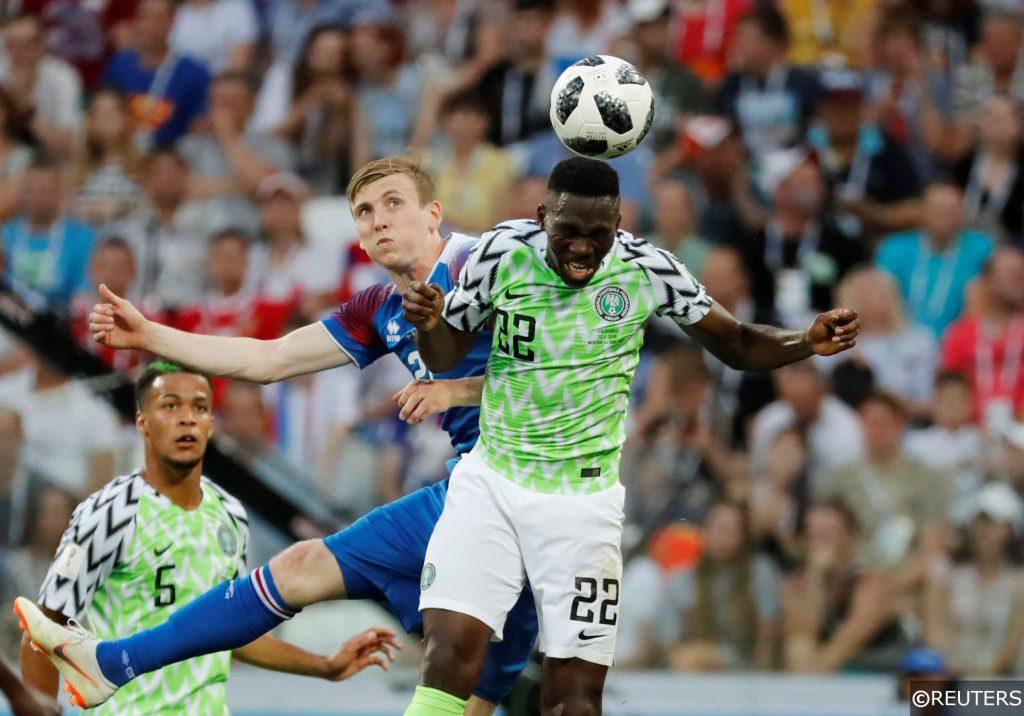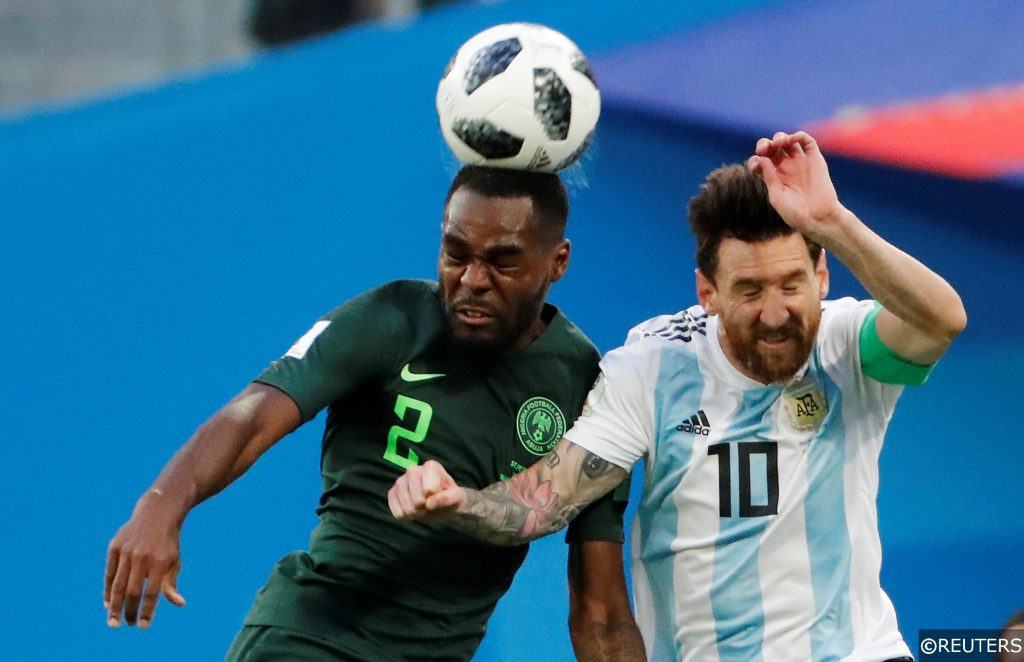
Born in the south east of Ireland, Simon put his life-long love of football to good use when he started a successful independent blog in 2010. That opened up an alternative route to a career in journalism, and having had work published across a number of sites and publications, Simon joined the staff at Spotlight Sports Group in 2018.
Nigeria’s World Cup 2018 adventure came to an end this week, with a cocktail of the exceptional and the unexpected conspiring to send the Super Eagles crashing out of Group D. Lionel Messi’s magical control and finish for Argentina’s first goal was an inspired piece of play conjured up by a footballing genius, though the game’s deciding goal was volleyed home by the right boot of a clumsy left-footed defender.
Marcos Rojo’s goal was something that was completely out of the ordinary and one of those moments in football that you cannot prepare for. Gernot Rohr best-laid plans and tactical blueprint would have never run through a scenario where Marcos Rojo arrived near the penalty spot to expertly volley home a cross with his wrong foot.
The unlikely strike was enough to secure a crucial 2-1 victory for the Argentinians, and the win pushed them past Nigeria into second spot in Group D and on to the knock out stages in place of the Africans. Really, it was a game that Nigeria didn’t deserve to lose, though that will come as little consolation now.
Right from the whistle, the teams looked evenly matched and while quality in the final third was generally low at both ends (bar Messi’s flash of brilliance), Nigeria created more dangerous attacking situations than Argentina. There was a nervousness to their finishing however and Nigeria looked bereft of the cut-throat clinical edge they needed. With each chance that came and went, their grip on the contest loosened further, eventually slipping through their fingers completely.
Read More: Argentine scrape way into last 16 with dramatic 2-1 win
In the immediate aftermath, Nigeria’s devotees have been left dejected and crestfallen – understandably so. Though when the dust settles, the positives (of which there plenty), from the Super Eagles’ World Cup run will shine through.
Nigeria took the tournament’s youngest squad to Russia, with the average age of their players standing at 25.9 before the World Cup kicked off. Comparatively, the average age of the Argentina squad is nearly 4 years older at 29.3. The youthful make-up of the Super Eagle’s 23-man selection reflects the progress they have made in terms of the development of junior players in the country. Nigeria have won 3 the last 6 FIFA U17 World Cups in 2007, 2013 and 2017. They were also beaten finalists in 2009.
Exiting the World Cup at the group stage is of course lamentable, though Nigeria were equal parts impressive and unlucky in their defeats to Croatia and Argentina. For many of their younger players, reputations have been enhanced and valuable experience gained. It feels like the beginning of something rather than the end for the Super Eagles. Let’s take a closer look at some of the Nigerian players who made an impact in Russia.
Francis Uzoho
The 2018 World Cup’s youngest goalkeeper, 19-year old Francis Uzoho started all three of Nigeria’s Group D matches against Croatia, Iceland and Argentina. Uzoho has been involved in the Nigerian national team set-up for a number of years. He was just 14 when he was a member of the Super Eagles’ FIFA U17 World Cup winning squad in 2013.
Uzoho, who is contracted to Deportivo La Coruna in Spain, has yet to fully crack first team club football, though he became the youngest ever foreign goalkeeper to debut in La Liga when he played against SD Eibar last October.
Uzoho’s unflappable demeanour and command of his penalty area helped to illustrate a remarkable maturity in the teenager’s character and already it looks as though Nigeria have their goalkeeping position sorted for the next decade.
Read More: World Cup Group Permutations: Who Can Still Qualify For The Last 16?
Oghenekaro Etebo
Versatile midfielder Oghenekaro Etebo excelled in midfield alongside Wilfred Ndidi, making full use of his combative skills to rack up an average of 3.7 tackles per game in Group D. To complement his steel, Etebo displayed an impressive range of accurate distribution, completing on average 88% of his passes. His pass completion rate was the highest in Nigeria’s squad.
The 22-year-old was one of six Nigerian’s to have played every minute of each of the team’s Group D matches. Etebo will hope to bring that energy to the notoriously physical Championship in England next season. Etobo joined relegated Stoke City for around £6.5m from Portuguese side Feirense just before the World Cup.
Kenneth Omeruo

Having been left on the bench for Nigeria’s opening Group D defeat to Croatia, Kenneth Omeruo was drafted in to the starting XI against Iceland. His imperious performance in helping the Super Eagles’ keep a clean sheet against the Strákarnir okkar ensured he kept his place for match day three against Argentina.
The 24-year old centre half has been recycling through Chelsea’s infamous loan-system since 2012, and he has had seasons at ADO Den Haag, Middlesbrough, Kasimpasa, Alanyaspor and Kasimpasa since signing with the Blues. Omeruo has never made a senior appearance for Chelsea, though his World Cup displays suggest that he is ready for top-level club football. It’s likely that the classy defender will have to carve out a career for himself away from Stamford Bridge however.
Read More: Academy Analysis Group D: Which clubs produced the most players at World Cup 2018?
Wilfred Ndidi
Robust holding midfielder Wilfred Ndidi was already one of the most highly regarded young players in the Premier League before this summer, though his performances in Russia should serve to add to his already burgeoning reputation.
In Nigeria’s three Group D fixtures, Ndidi was simply a ball recovery machine. His average of 5 tackles per game has only been bettered by Mexico’s Hector Herrera’s 5.5 per game so far. Like his partner in crime Etebo, Ndidi played in every minute of Nigeria’s truncated World Cup involvement.
At just 21, the sky is the limit for Ndidi who is already reportedly on the radar of some of Europe’s biggest clubs.
Brian Idowu

The very definition of an international late bloomer, 25-year old utility defender Brian Idowu only made his debut for Nigeria late last year, when he came off the bench to score in the Super Eagle’s 4-2 friendly win, ironically, against Argentina.
Russian football fans might well have known much more about Idowu than their Nigerian counterparts ahead of the 2018 World Cup. Idowu may have been turning out for the Super Eagles in Russia, but he was born in St. Petersburg and has been contracted to Russian Premier League side Amkar Perm since 2010.
Idowu played down Nigeria’s left in their three Group D matches, first at left back, then a little further forward at wing back for the Super Eagles after their post-Croatia defeat tactical reshuffle. Idowu’s versatility allows him to play right across the backline and even in midfield at club level.
Follow Free Super Tips on Twitter to stay up to date with our daily tips and predictions or browse more football content on our website:


